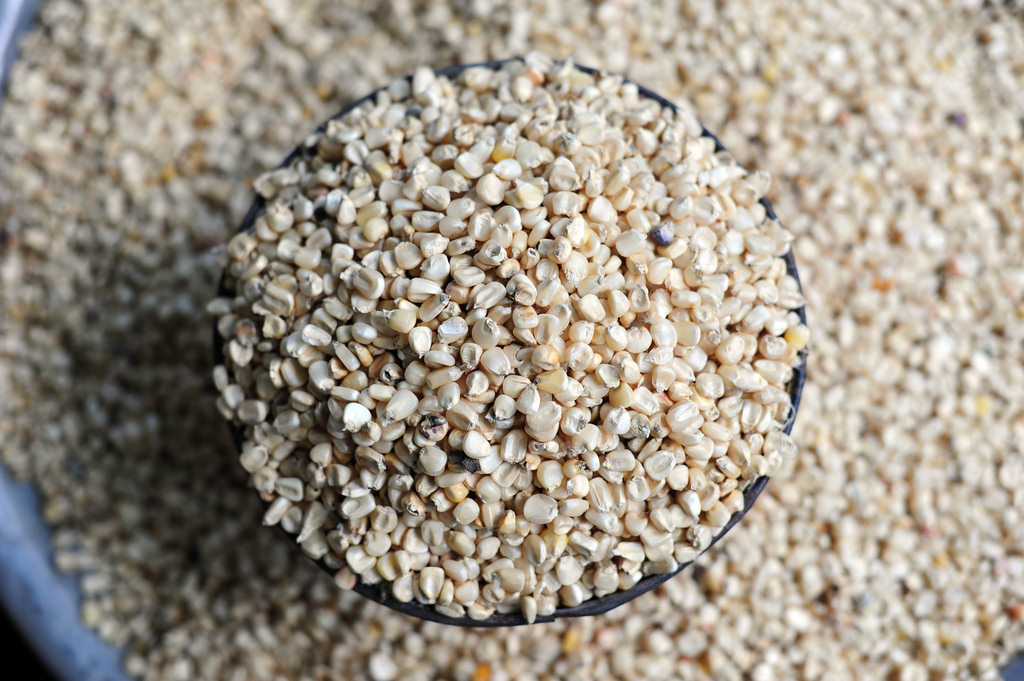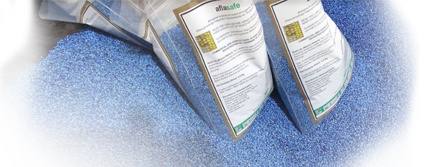ACCRA, GHANA, 27th AUGUST 2019 – The International Institute of Tropical Agriculture (IITA) and Ghana Commodity Exchange (GCX) recently signed a Memorandum of Understanding (MoU) between the two organisations.

The joint MoU, signed on 21st August, aims to improve food safety in Ghana by tackling aflatoxin in food. Like many other afflicted countries in the tropics and elsewhere, aflatoxin is a real and present danger, a fact that is now being increasingly reported in Ghana’s mass media. This increased media coverage is mostly due to the ongoing and unrelenting nationwide aflatoxin-awareness campaign.
Aflatoxin is not only a threat to the health of Ghanaians but also locks the door on lucrative external markets that enforce stringent aflatoxin-safety limits for food and animal feed, such as the European Union. Some of the products from Ghana have indeed been repeatedly rejected by these markets on account of aflatoxin, with public alerts which dent the country’s image and harm its market standing.
GCX wants to change that, as a core part of its mission. Farmers and farmer organisations must first meet quality specifications before they can trade on GCX, hence why GCX is proactively seeking and providing solutions to aflatoxin, as part its quality assurance mandate. “Our vision is to transform Ghana’s economy by creating prosperity for all in commodity value chains and become a regional and global trading hub for all commodities,” revealed Dr Kadri Alfah, GCX CEO. “Our goal is to transform Ghana and African agriculture by creating more bargaining power for smallholder farmers. This includes providing them with accurate and reliable information, new methods and access to secured storage, and establishing or enhancing their access to credit and agricultural financing. Our aspiration is to reduce transaction costs and information asymmetries using technology to disseminate market information, while also creating better supply chains.”
GCX plans to extend its activities to all of Ghana’s farmlands. It is gunning to overhaul the country’s agricultural sector by transforming it from a fragmented entity with high transaction costs and suboptimal standards to a thriving, dynamic, reliable and efficient market system. To achieve this, GCX serves as a one-stop shop for end-to-end services for commodity warehousing, quality control, trading, clearing, settlement and market data dissemination. Aflasafe GH02 partially contributes to some of these goals and aspirations.
As both IITA and GCX are keen to transform Africa’s agriculture for the better, the two organisations agreed to advocate for policies that will enhance Ghana’s food safety.
“IITA is very pleased to partner with GCX to build the capacity of GCX Warehouse Officers and stakeholders on aflatoxin and how to control it, including using Aflasafe GH02 alongside good agricultural practices,” said Mr Abdou Konlambigue, Managing Director of IITA’s Aflasafe Technology Transfer and Commercialisation initiative. “These officers will in turn train GCX’s network of farmers to ensure that goods traded on the GCX Platform are aflatoxin-safe. This will have a multiplier effect: it means traders will now be able to meet strict aflatoxin limits, which will open up new and more lucrative markets, resulting in higher profits and bringing into Africa much-needed export revenue.”
As part of this MoU, GCX will create awareness on aflatoxin and introduce aflatoxin management using Aflasafe in its training manuals, and convene relevant trainees. For its part, IITA will, in addition to providing the training, also advise GCX on optimal methods and equipment for independent aflatoxin testing. A Joint Steering Committee will oversee the effective implementation of the MoU.
The MoU is part of a structured approach by IITA to work in close partnership with – and to equip and enable – actors from the public, private and non-profit sectors in a bid to enhance Ghana’s food safety by ramping up awareness on aflatoxin along the entire value chain for groundnuts, maize and sorghum, all of which are key crops in Ghana. In the public sector, IITA is already working on aflatoxin awareness with the Ghana Standards Authority and the Ministry of Food and Agriculture, and now, GCX as well. GCX contributes to the government’s Growth and Transformation Plan to double production of key staple crops, improve storage and improve the general wellbeing of Ghanaian farmers and the people of Ghana.
Besides Ghana, IITA has forged private-sector partnerships to commercialise Aflasafe in other countries in West Africa and beyond, including Burkina Faso, The Gambia, Nigeria, Senegal and Tanzania.
About IITA: The International Institute of Tropical Agriculture (IITA) is a not-for-profit institution that generates agricultural innovations to meet Africa’s most pressing challenges of hunger, malnutrition, poverty and natural resource degradation. Working with various partners across sub-Saharan Africa, we improve livelihoods, enhance food and nutrition security, increase employment, and preserve natural resource integrity. IITA is a member of CGIAR, a global agriculture research partnership for a food-secure future.
About GCX: The GCX is a private company limited by shares incorporated in 2017, and serves as a market place for linking commodity producers and buyers to trade under set rules. The government of Ghana provided the initial capital to set up the GCX, and therefore has 100% ownership. The exchange started maize and soya bean contracts for immediate delivery upon its launch in 2018. The GCX currently supports over 300,000 farmers directly and indirectly with services including commodity aggregation, warehousing, post-harvest management, grading and certification, quality control, re-bagging services, branding, market information and markets to sell their harvested products. The exchange plans to trade sesame seed and sorghum in September 2019.
Media contacts:
- Njeri Okono, Communications Specialist, Aflasafe Technology Transfer and Commercialisation initiative (ATTC)
- Richard Ankrah, Business Development Manager, Ghana Commodity Exchange










